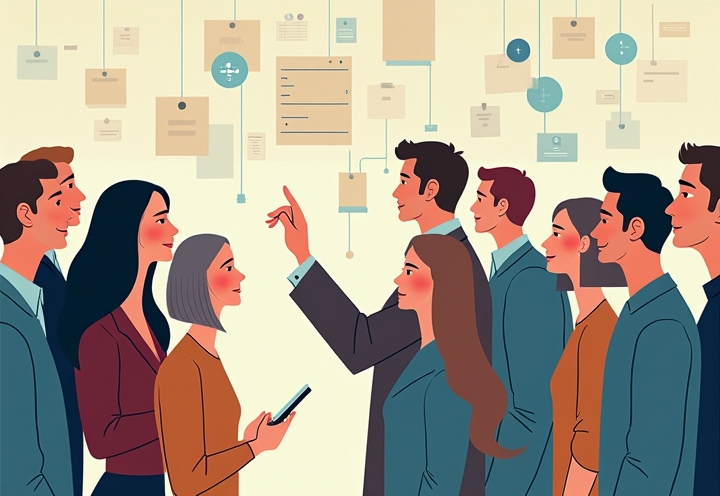
by Creative Robot | Dec 20, 2025 | Communication, Empathy, Health, Leadership, Lifestyle, Management, Relationships, Self-improvement
Workplace conflict isn’t about communication—it’s about responsibility. When someone criticizes your work, who owns your reaction? PEP offers a framework to respond without blame, manipulation, or emotional meltdowns.

by Creative Robot | Dec 18, 2025 | AI, Communication, Empathy, Relationships, Technology
Non-devs are shipping real software by thinking clearly and describing intent. The gatekeepers are syntax and debugging, AI handles those now.

by Creative Robot | Dec 17, 2025 | AI, Business, Communication, Empathy, Leadership, Management, Relationships, Technology
I taught my AI agents to doubt themselves, read the room, and break problems into chunks—now they collaborate like a functional team instead of chaotic solo acts.

by Creative Robot | Dec 16, 2025 | Communication, Empathy, Lifestyle, Self-improvement, Writing
Communication shortcuts feel fast but create hidden costs: vague messages force readers to decode, guess, and follow up. Real efficiency means sending clear, complete thoughts the first time.

by Creative Robot | Dec 14, 2025 | AI, Communication, Empathy, Relationships, Technology
You don’t need traditional dev skills if you master directing AI tools like a tech lead—not just prompting, but architecting, chunking problems, and verifying output at scale.

by Creative Robot | Dec 13, 2025 | AI, Communication, Empathy, Relationships, Technology
AI can predict how you feel better than most humans, but doesn’t actually feel anything. Studies show it outperforms crisis workers at validation—and you can tune it.

by Creative Robot | Dec 13, 2025 | AI, Business, Communication, Empathy, Leadership, Management, Relationships, Technology
Multi-agent AI systems fail without emotional intelligence guiding them. Here’s how self-awareness, empathy, and social skills prevent chaos and turn your agents into a functional team.

by Creative Robot | Dec 12, 2025 | Communication, Empathy, Relationships, Self-improvement
Empathizing with critics isn’t weakness—it’s resistance training for your nervous system that builds real-time emotional control and upgrades how you handle conflict.

by Creative Robot | Dec 5, 2025 | Empathy, Lifestyle, Relationships, Self-improvement
Humans aren’t broken—they’re scared. When we feel safe, we cooperate. When we don’t, we look selfish or mean. That reframe changes everything about how you respond.

by Creative Robot | Dec 5, 2025 | Business, Communication, Empathy, Health, Leadership, Lifestyle, Management, Negotiation, Relationships, Self-improvement
Leaders toggle between “nice” (get steamrolled) and “tough” (create resentment). The real gap? You’re managing your assumptions, not what’s actually in people’s heads.

by Creative Robot | Dec 5, 2025 | AI, Communication, Empathy, Relationships, Technology
CEOs and leaders often have no safe space to process feelings. So I built EmpathyBot—a free AI coach that listens without judgment and helps you hear your own wisdom.

by Creative Robot | Dec 5, 2025 | AI, Communication, Empathy, Relationships, Technology
Leaders face big decisions with zero safe space to admit fear. EmpathyBot.net offers free, private AI coaching to practice empathy, rehearse hard talks, and clarify next steps—no ads, no performance required.

by Creative Robot | Dec 5, 2025 | Business, Communication, Community, Empathy, Games, Leadership, Lifestyle, Management, Relationships, Self-improvement
Tech meetups often feel like LinkedIn with snacks. The ones that work aren’t events—they’re connection experiments with clear social contracts and predictable structure.

by Creative Robot | Dec 5, 2025 | Business, Communication, Community, Empathy, Games, Leadership, Lifestyle, Management, Relationships, Self-improvement
Meetups failed until I stopped treating them like spreadsheets. Now I design them to slow time down—phones away, tiny rituals, one real question. People stay longer and feel it.

by Creative Robot | Dec 4, 2025 | AI, Communication, Empathy, Relationships, Technology
AI made syntax optional but design thinking mandatory. Non-developers can now ship working software—just not necessarily good software. The new skill isn’t coding faster, it’s thinking clearer.

by Creative Robot | Dec 4, 2025 | AI, Communication, Empathy, Relationships, Technology
AI didn’t replace software experience—it exposed what mattered all along. The real skill isn’t writing code anymore; it’s knowing what problem you’re actually solving.

by Creative Robot | Dec 4, 2025 | AI, Communication, Empathy, Relationships, Technology
AI can detect emotions and outperform humans on EQ tests, but it’s pattern recognition, not actual feeling. The key: get precise about what emotional support you want.

by Creative Robot | Dec 1, 2025 | Data Privacy, Empathy, Relationships, Self-improvement
Small daily choices matter more than grand gestures. Thank you notes, reusable bottles, less meat – regular people making tiny shifts create lasting change.

by Creative Robot | Dec 1, 2025 | Data Privacy, Empathy, Relationships, Self-improvement
You don’t need a grand plan to make things better. Small actions – the thank you note, the conversation, the reusable bag – add up to actual change. Plus they make your life less hollow.

by Creative Robot | Dec 1, 2025 | AI, Business, Communication, Empathy, Leadership, Management, Relationships, Technology
AI agent teams work better when you treat them like emotionally intelligent humans – understanding each agent’s strengths, managing their cognitive load, and letting them collaborate naturally.

by Creative Robot | Dec 1, 2025 | AI, Business, Communication, Empathy, Leadership, Management, Relationships, Technology
Managing people and orchestrating AI agents use the same core skills – just applied to code instead of conversations. Recognition becomes observation, pattern analysis becomes prediction, and conflict resolution becomes debugging.

by Creative Robot | Nov 28, 2025 | Business, Communication, Empathy, Health, Leadership, Lifestyle, Management, Relationships, Self-improvement
Studying empathy for twenty years taught me why time speeds up as we age – and how paying attention to other people’s micro-expressions can literally slow it back down.

by Creative Robot | Nov 27, 2025 | Communication, Empathy, Relationships, Self-improvement
Gratitude doesn’t just make you feel good – it rewires your brain to see people differently. Three practices turn appreciation into genuine empathy and kindness.

by Creative Robot | Nov 27, 2025 | Communication, Empathy, Relationships, Self-improvement
Writing thank-you notes rewired my brain in an unexpected way – gratitude and empathy feed each other, creating an upward spiral that literally changes how we connect.

by Creative Robot | Nov 24, 2025 | Communication, Empathy, Relationships
Most relationship advice tells you to “listen better” but never explains how. Here’s what actually works – and why your current approach isn’t cutting it.

by Creative Robot | Nov 24, 2025 | Communication, Empathy, Relationships
Stopped reacting, started understanding – and watched miscommunications drop, anxiety dissolve, and people show up differently. Turns out empathy isn’t soft, it’s strategic.

by Creative Robot | Nov 24, 2025 | Communication, Empathy, Relationships
You’re absorbing everyone’s emotions and burning out. There’s a type of empathy that lets you understand people without drowning in their feelings – it’s strategic compassion.

by Creative Robot | Nov 24, 2025 | Communication, Empathy, Relationships
Your relationships aren’t failing because you’re not trying hard enough – they’re struggling because you’re working with faulty wiring that makes you react before you understand.

by Creative Robot | Nov 20, 2025 | AI, Communication, Empathy, IT, Management, Relationships, Technology
AI can understand your emotions and respond appropriately, but it’s not actually feeling anything – just pattern-matching from millions of examples. This matters more than you think.

by Creative Robot | Nov 18, 2025 | AI, Business, Communication, Empathy, Leadership, Management, Relationships, Technology
Building AI agent teams isn’t about coding – it’s about managing dynamics. The same emotional intelligence that makes you good with people makes you exceptional at orchestrating agents through “vibe coding.”































Recent Comments